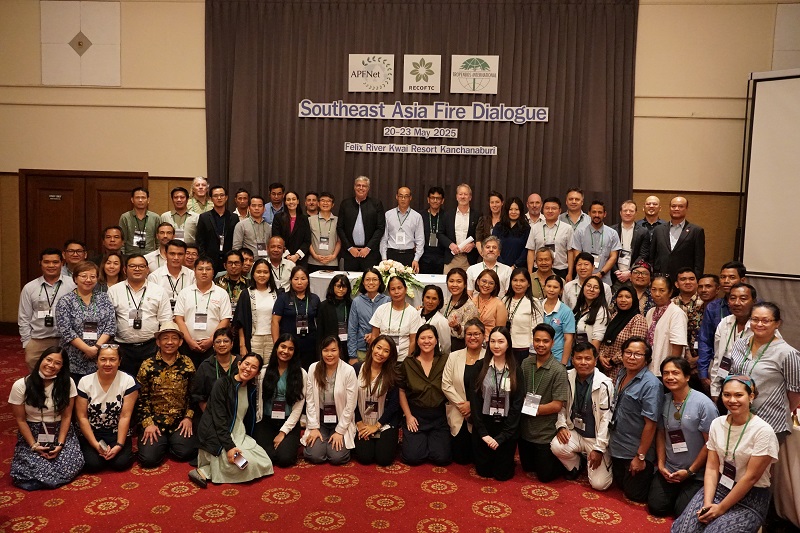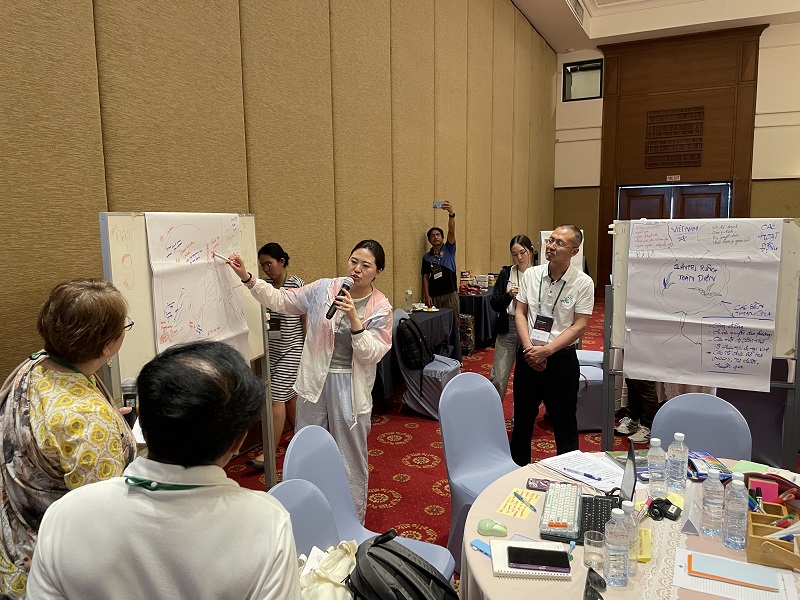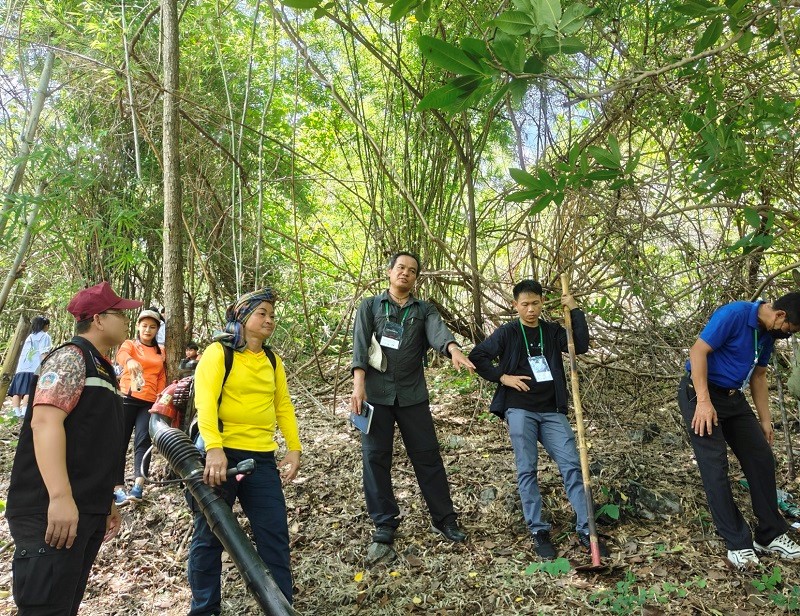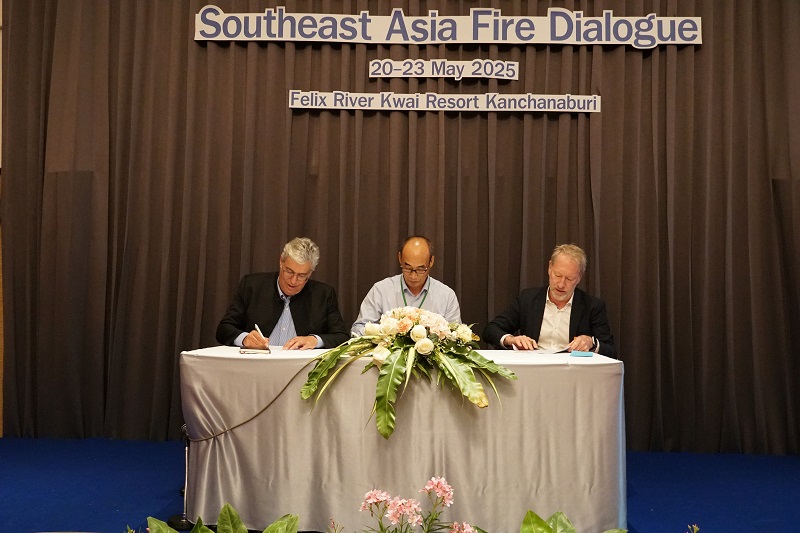KANCHANABURI, Thailand – May 23, 2025 – The Southeast Asia Fire Dialogue, a pivotal four-day event co-sponsored by the APFNet, RECOFTC and Tropenbos International, concluded in Kanchanaburi, Thailand. The dialogue, held from May 20-23, brought together a wide array of stakeholders to address the escalating challenges of wildfires in the region and culminated in the landmark launch of the Southeast Asia Fire Management Mechanism (SEA-FiMM).

Southeast Asia Fire Dialogue, May 20-23, 2025, Kanchanaburi, Thailand (Photo/RECOFTC)
The event featured intensive discussions and knowledge sharing through its Community Fire Dialogue and Multi-stakeholder Fire Dialogue. APFNet shared its forest fire management practices and techniques from its demonstration projects in Cambodia, China, and Lao PDR, alongside valuable experiences in community co-management for forest fire management at the APFNet Wangyedian Base in Inner Mongolia, China. The presentation garnered interest and positive feedback from participants, who were keen to learn about adaptable and effective models.

Ms Ma Kun and Mr. Ma Chengong shared community co-management for forest fire management in APFNet Wangyedian Base (photo/APFNet)
The dialogue sessions facilitated exchanges among representatives of local communities, government officials, non-governmental organizations, researchers and the private sector. Participants actively shared lessons and best practices, focusing on community-based approaches to reduce wildfire risks, and identified strategies for scaling up effective solutions. Feedback highlighted the success of the event in promoting inclusive dialogue and linking fire management efforts to broader climate goals and regional frameworks, such as the ASEAN haze-free initiative. A practical field trip to the Ban Chong Sadao community offered participants firsthand experience of local wildfire management practices and an opportunity to understand the associated challenges and local adaptations. This immersive experience was highly valued for grounding discussions in on-the-ground realities and fostering peer-to-peer learning.

A field trip to the Ban Chong Sadao community to understand community-based wildfire management practices in Thailand (Photo/APFNet)
A major outcome of the dialogue was the joint initiation of the Southeast Asia Fire Management Mechanism (SEA-FiMM) by APFNet, RECOFTC and Tropenbos International.

APFNet, RECOFTC and Tropenbos International sign an agreement to officially launch the Southeast Asia Fire Management Mechanism (SEA-FiMM)(Photo/RECOFTC)
Dr Lu De, Executive Director of APFNet, elaborated on the impetus behind this initiative: “APFNet has long recognized that forest fires, particularly their transboundary nature, pose a significant threat to ecological security and sustainable livelihoods in Southeast Asia. Our initial vision for supporting a mechanism like SEA-FiMM stems from a deep-seated commitment to promote sustainable forest management and leverage regional strengths. “He added that this vision was driven by the pressing need for a dedicated platform that facilitates the sharing of proven practices and fosters genuine, long-term cooperation. Looking ahead, Dr. Lu De explained that APFNet envisions SEA-FiMM evolving into a dynamic hub for policy dialogue, technical support, and innovative solutions in fire management. He hoped the mechanism would ultimately empower local communities, strengthen national capacities, and contribute significantly to a more fire-resilient Southeast Asia where ecosystems thrive and people are protected.
Dr. David Ganz, Executive Director of RECOFTC, emphasized that the new mechanism embodies three key principles: collaboration, commitment, and governance. He acknowledged the significant task of addressing the region’s fire challenges. Still, he expressed strong confidence in the initiative’s ability to “make a difference, to really help local communities scale up and replicate proven models to various contexts.” Tropenbos International (TBI) was welcomed as the first official partner to join the SEA-FiMM. Mr. Joost van Montfort, Executive Director of TBI, noted that while challenges exist, the mechanism’s core purpose is collectively seeking solutions through shared learning. He affirmed Tropenbos International’s robust support for regional fire dialogue, viewing SEA-FiMM as a pivotal initiative for tackling Southeast Asia’s complex forest fire challenges.
Initiated on the proposal of APFNet and RECOFTC, the Southeast Asia Fire Management Mechanism (SEA-FiMM) aims to serve as a dedicated regional platform to enhance collaboration, knowledge exchange, and capacity building for integrated fire management across Southeast Asia. The vision of SEA-FiMM is to foster more resilient landscapes and communities, significantly reduce the negative impacts of wildfires, and support the achievement of sustainable development and climate objectives in the region. The mechanism is designed as an open and inclusive platform for other regional partners to join, and in a significant demonstration of this collaborative spirit, Tropenbos International (TBI) was welcomed as the first partner organization to join the initiative. The launch of SEA-FiMM marks a significant step forward in collective efforts to address forest fire challenges in the region, with APFNet reaffirming its commitment to supporting such crucial collaborative endeavours with regional partners.
Please find more information on the SEA-FiMM.